新概念英语第一册lesson91-92
(完整版)新概念第一册Lesson91-92
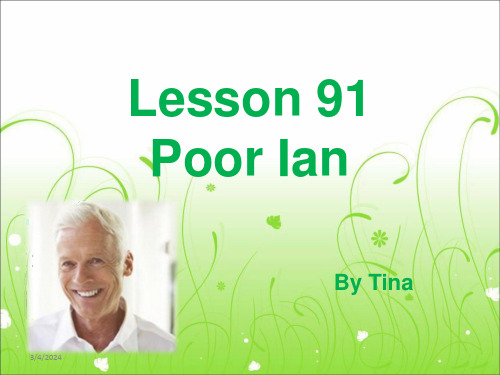
come to work→work等
• 现在完成时可表示持续到现在的动作或 状态,动词一般是延续性的,如
• live, teach, learn, work, study, know.
• 过去时常用的非持续性动词有: • come, go, leave, start, die, finish,
become, get married.
特疑词+ have (has)+主语+p.p?
(2) 表示动作发生在过去某个不确定的时间, 但对现在留下了某种影响和结果。 常被just、already、yet 等副词修饰。
-Have you had lunch yet? 你(已经)吃午饭了吗? -Yes, I have. I‘ve just had it. 我刚刚吃过。(现在我不饿了)
(强调动作,过程)
move out (of) 搬出来
move away
搬走
move from…to…
从…搬到…
②感动,打动
This story moved me. 这个故事感动了我。 The news moved him very much. 这消息使他很感动。
Байду номын сангаас
★ miss [mis] v. 想念,思念
★ person ['pə:sən] n. 人
He is a nice/good person. 他是个好人。 in person 亲自,直接的 He will go to get the money in person. 他将亲自去取钱。
★ personal adj. 个人的,私人的
['pə:sənəl]
• The patient is lying still. • 病人安静地躺着。
新概念第一册91-92课知识点
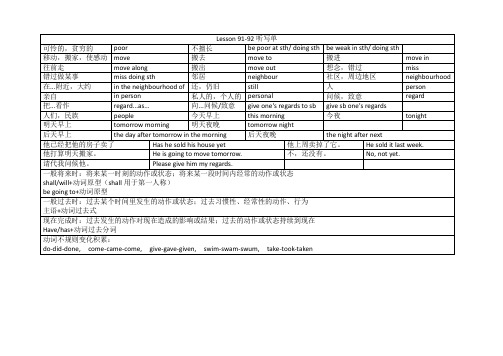
可怜的,贫穷的
poor
不擅长
bepoor at sth/ doing sth
be weak in sth/ doing sth
移动,搬家,使感动
move
搬去
moveto
搬进
movein
往前走
movealong
搬出
moveout
想念,错过
miss
错过做某事
missdoing sth
givesb one's regards
人们,民族
people
今天早上
thismorning
今夜
tonight
明天早上
tomorrowmorning
明天夜晚
tomorrownight
后天早上
theday after tomorrow in the morning
后天夜晚
thenight after next
Have/has+动词过去分词
动词不规则变化积累:
do-did-done, come-came-come, give-gave-given, swim-swam-swum, take-took-taken
一般将来时:将来某一时刻的动作或状态;将来某一段时间内经常的动作或状态
shall/will+动词原型(shall用于第一人称)
be going to+动词原型
一般过去时:过去某个时间里发生的动作或状态;过去习惯性、经常性的动作、行为
主语+动词过去式
现在完成时:过去发生的动作对现在造成的影响或结果;过去的动作或状态持续到现在
邻居
neighbour
完整版新概念第一册Lesson91 92
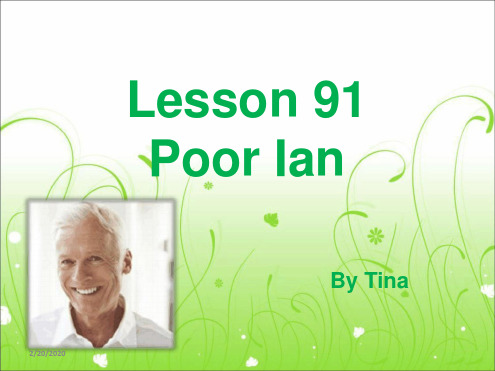
★ people [ 'pi:pl] n. 人们
①n. 人们
There are a lot of
people in the
street.
街上有很多人。
the people 民众,人民,国民
? ②贫穷的 ? 反义词:rich ? a poor man 贫穷的人 ? the poor 穷人 ? We should help the poor. ? 我们应该帮助穷人
? ③笨拙的,差劲的
? be poor at sth./ be poor at
doing sth.
不擅于…
? be good at sth./be good at doing
Lesson 91 Poor Ian
2/20/2020
By Tina
2/20/2020
2/20/2020
2/20/2020
New words and expressions
2/20/2020
? still [stil]
adv. 还,仍旧
? move [mu:v]
v. 搬家
? miss [mis]
? The patient is lying still. ? 病人安静地躺着。
★ move [mu:v] v. 搬家 ① v. 搬家;移动
They moved from Nanjing to Shenzhen. 他们从南京搬到深圳。来自move in搬进
(强调状态,结果)
move into 搬进来
特疑词+ have (has)+ 主语+p.p ?
新概念一 lesson91-92 (完整版)
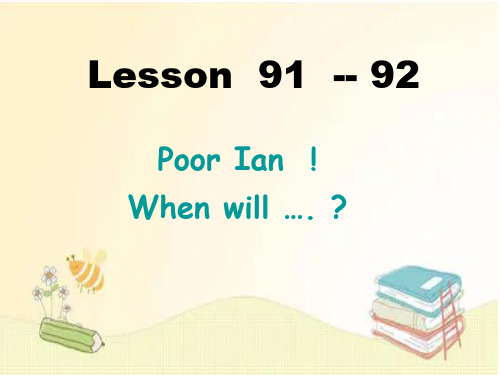
New words and expressions
• poor [ puE ]
adj.
3)笨拙的,差劲的
poor jokes 差劲的笑话
a poor excuse 笨拙的借口
New words and expressions
• poor [ puE ]
adj.
3)笨拙的,差劲的 sth
be poor at 不擅长….. doing sth eg: My daughter is poor at swimming.
( D)7.Mr smith _______________to Tokyo and he will be back in
a week • A. has been B. has visited C. has sent D. has gone
( B)8.They___________________ China for two years
Lesson 91 -- 92
Poor Ian ! When will …. ?
new words
• 1 believe [bi'li:v] v.相信,认为 • 7 because [bi'kɔz] conj.因为
• 2 may [mei] (用于请求许可)可以 • 8 retire [ri'taiə] v.退休
new words
New words
still [ stil ]
person [ `pE:sEn ]
adv.还,仍旧 move [mu:v ]
v.搬家 miss [ mis ]
n.人 people [ `pi:pEl]
n.人们
v.想念,思念
poor [ puE ]
新概念英语第一册lesson91-92
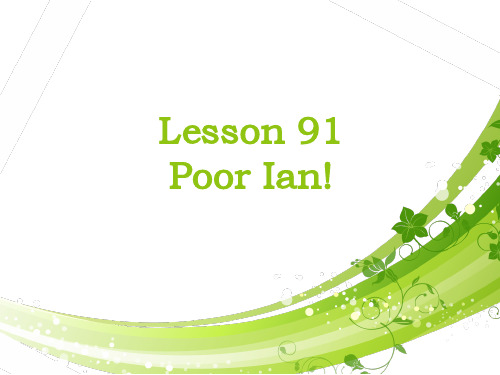
6.He’s a very nice person.
表达人的人品很好可以用 good或nice。 He's a good guy. He is a nice man.
他是个好人。
7.When will the new people move into this house? move to = move into 搬进。 people = neighbours
Lesson 91 Poor Ian!
New Words
still move miss neighbor person people poor
adv. 还,仍旧 v. 搬家 v. 想念,思念 n. 邻居 n. 人 n. 人们 adj. 可怜的
Free talk
Do you liken the blanks.
LIDA:He's a very nice person.We'll all miss him. CATHERING:When will the new people move into this house? JENNY:I think that they'll move in the day after tomorrow. LINDA:Will you see Ian today, Jenny? JENNY:Yes, I will. LINDA:Please give him my regards. CATHERING: Poor Ian!He didn't want to leave this house. JENNY:No, he didn't want to leave.but his wife did!
Why?
Fill in the blanks.
新概念英语第一册91-92课
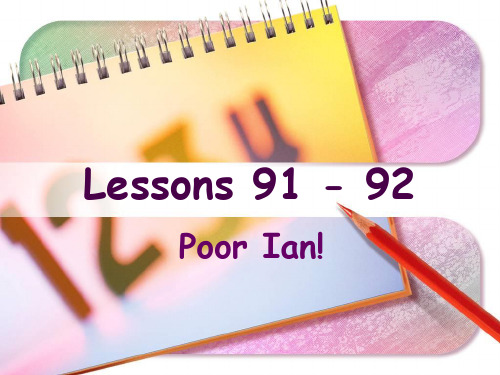
Poor Ian!
New words and expressions
still adv. move v. miss v. neighbour n. person n. people n. poor adj.
还,仍旧 搬家 想念,思念 邻居 人 人们 可怜的
引导宾语从句的关联词有从属连词,疑问代词, 疑问副词,缩合连接代词,缩合连接副词等。
Grammar--宾语从句
I am afraid that you can't see him today. 我恐怕你今天见不到他。 (关联词是从属连词that)
在非正式文体中关联词that常被省去。 eg:I hope you can come tomorrow. 我希望你明天能够来。 (that省略)
JENNY:
No, not yet. He's still here. He's
going to move tomorrow.
move to 搬家到... eg:All her family have moved to the US.
她全家人都已经搬到美国去住了。
完整的回答: He hasn't moved to his new house
1)一般将来时表示将来某一时刻的动作、状态以 及打算。该时态一般与表示将来意义的时间状语 连用。
tomorrow this month the day after tomorrow next week in two days' time from now on in the future
Grammar--宾语从句
用作宾语的从句叫做宾语从句,即充当宾语成份 的不是一个单词或词组,而是一个句子。
新概念英语第一册第91-92课ppt课件
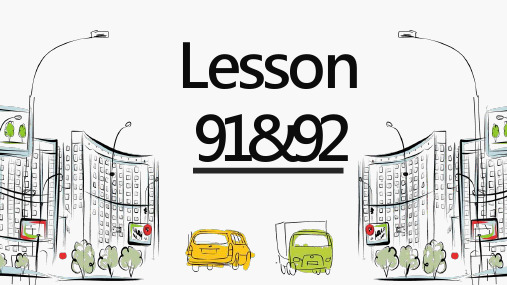
6
★neighbour
n. 邻居
neighbourhood
n.四邻,邻近地区
这一带很安静。
This is a quiet neighbourhood.
他要搬到这一带。
He is moving into the neighbourhood.
in the neighbourhood of
10
rain snow leave get up arrive finish work have a holiday drive home
have a haircut telephone me have a shave pack his bags sweep the floor paint this room repair my car
He’s still here.
将来时的时间状语
He’s going to move tomorrow.
be going to 打算做某事
25
将来时的时间状语
CATHERING: When? Tomorrow morning?
JENNY:
No. Tomorrow afternoon.
I'll miss him. 思念,想念 错过
make an appointment
11
02
Practice
12
• still • move • miss • neighbour • person • people • poor
v. 想念,思念 n. 邻居 adv. 还,仍旧 v. 搬家 n. 人 adj. 可怜的 n. 人们
13
03
Game Time
新概念英语第一册lesson91-92学习资料

Grammar
一般将来时 (the future tense)
1.一般将来时表示在将来某一时间将要发生 的动作或存在的状态,也可表示将来某一 段时间内经常发生的动作或存在的状态。
2.结构: Shall (第一人称I we ) /will+动词原形
be going to +动词原形
与一般将来时连用的时间状语
adv. 还,仍旧 v. 搬家 v. 想念,思念 n. 邻居 n. 人 n. 人们 adj. 可怜的
already用于陈述句和肯定句句中
A :Has Ian sold his house yet? yet用于疑问句和否定句的句尾。
B: Yes, he has. He sold it last week. A: Has he moved to his new house yet?
按照中文习惯去赞同别人的说法,而是要根据 事实来说,因此回答no, he didn’t want to leave. 但是翻译成中文的时候要说,是的,他 不愿意离开。 反意疑问句,前肯后否,前否后肯。 例句: He didn’t go to school last week, did he?
No, he didn’t. 是的,他没去。 Yes, he did. 不,他去了的。
B: No, not yet. He’s still here. He’s going to move tomorrow.
A: When? Tomorrow morning?
B: No. Tomorrow afternoon. I’ll miss him. He has always been a good neighbour .
A:I think that they will move in the day after
(完整版)新概念第一册Lesson91-92
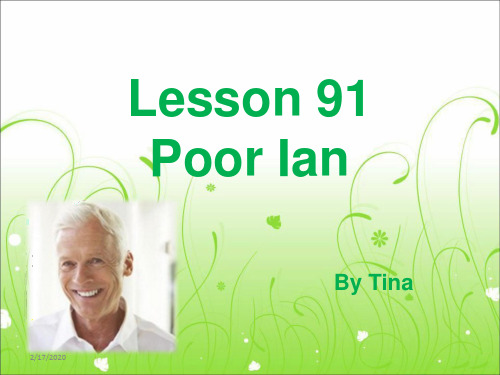
person和people用法:
person 强调的个体的人, 可以有复数形式 persons
people 通常是人的统称, 单复数形式相同
★ poor [puə] adj. 可怜的
① v. 想念,惦念 • I missed you.
我想你
② v. 错过;未做到 • He overslept and missed his train. • 他睡过了头,错过了他那班火车。
• miss doing sth. 未能 I missed buying the magazine. 我未能买到那本杂志。
(4)表示说话前发生过一次或多次的动作,现 在成为一种经验,一般译为汉语“过”,
常带有twice , ever, never,three times 等 时间状语。
I have been to Beijing twice. 我去过北京两次。
不规则动词的过去式以及过去分词 巧记规律
• AAA: put– put –put let—let –let • ABA: become—became—become • ABB: stand—stood—stood • ABC: eat— ate—eaten
v. 想念,思念 n. 邻居 adv. 还,仍旧 v. 搬家 n. 人 adj. 可怜的 n. 人们
Grammar
• 复习:现在完成时
★ 现在完成时的用法:(1)现在完成时表示过 去某时发生的行为对主语目前产生的影响。即
用过去发生的某个行为来说明现在的某种情况。
• 肯定句式: 主语+have (has)+p.p • 否定句式: 主语+have (has)+not +p.p • 一般疑问句: Have (Has)+主语+p.p? • 特殊疑问句:
新概念英语第一册第91-92课-Poor Lan
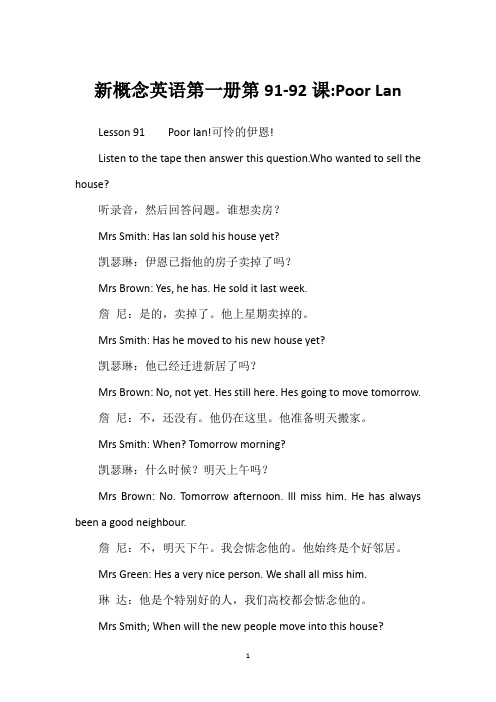
新概念英语第一册第91-92课:Poor LanLesson 91 Poor Ian!可怜的伊恩!Listen to the tape then answer this question.Who wanted to sell the house?听录音,然后回答问题。
谁想卖房?Mrs Smith: Has Ian sold his house yet?凯瑟琳:伊恩已指他的房子卖掉了吗?Mrs Brown: Yes, he has. He sold it last week.詹尼:是的,卖掉了。
他上星期卖掉的。
Mrs Smith: Has he moved to his new house yet?凯瑟琳:他已经迁进新居了吗?Mrs Brown: No, not yet. Hes still here. Hes going to move tomorrow.詹尼:不,还没有。
他仍在这里。
他准备明天搬家。
Mrs Smith: When? Tomorrow morning?凯瑟琳:什么时候?明天上午吗?Mrs Brown: No. Tomorrow afternoon. Ill miss him. He has always been a good neighbour.詹尼:不,明天下午。
我会惦念他的。
他始终是个好邻居。
Mrs Green: Hes a very nice person. We shall all miss him.琳达:他是个特别好的人,我们高校都会惦念他的。
Mrs Smith; When will the new people move into this house?凯瑟琳:新住户什么时候搬进这所房子?Mrs Brown: I think that they will move in the day after tomorrow.詹尼:我想他们将会在后天搬进来吧。
Mrs Green: Will you see Lan today, Mrs Brown?琳达:詹尼,您今日会见到伊恩吗?Mrs Brown: Yes, I will.詹尼:是的,我会见到他。
新概念课堂笔记 第一册 Lesson 91-92

新概念英语课堂笔记第一册 Lesson 91-92【讲解】people作“人们〞讲时为集体名词 ,本身即为复数。
作“人民〞讲时 ,也是集体名词 ,其前一般加the。
作“民族〞讲时是可数名词 ,有复数形式 ,也可与a连用。
people常用于指大批人或不精确说明人数的场合;而person一般用于指烧炼的人或精确说明人数的场合。
some people一些人;two persons两个人。
【例句】There are lot of people on the street. 那条街上人很多。
The government must depend on the people. 政府必须依靠人民。
There are 56 peoples in China. 中国有56个民族。
poor【用法】adj. 可怜的;贫穷的;差的【词组】the poor 穷人【例句】The wine was poor. 这葡萄酒很劣质。
I feel sorry for that poor child. 我为那个可怜的孩子感到难过。
My spoken English is poor. 我口语很差。
NamesCatherine /ˈkæθərin/ 奈杰尔〔男子名〕Jenney /ˈdʒeni/ 詹尼〔男子名〕Linda /'lɪndə/ 琳达【译文】他一直都是个好邻居。
【用法】○1本句是用现在完成时表达一般现在时的含义 ,如此处用一般现在时 ,那么语气就比拟平淡。
○2 neighbour是一个具体名词 ,用来表示邻居;而neighbourhood是一个抽象名词 ,用来表示邻里关系。
I think that they’ll move in the day after tomorrow.【译文】我想他们将在后天搬进来吧。
【用法】○1 I think 后面加了一个宾语从句 ,由that引导:that they’ll move in the day after tomorrow.○2 move in“搬进去〞 ,此处in为副词 ,因其后没有宾语。
新概念英语第一册lesson91-92课件

★miss v. 想念,思念 ① v. 想念,惦念 • I miss you. ② v. 错过 他起晚了,错过了那班火车。 • He got up late and missed that train.
• • • •
★ person n.人 (强调个体,不分男女老少,有复数persons) The person in a hat is my father. He is a nicБайду номын сангаас/good person.他是个好人。
• He is going to paint this bookcase tomorrow. • I am going to spend the holiday next week. • They are going to buy some fruit this evening. be going to do 计划/打算做某事,表将来 • • • • He will go to America tomorrow. I will buy a car next year. They will have a party tomorrow evening. will do 将要……,表将来
you see Ian today, Jenny? Jenny: Yes, I will. Linda:Please give him my regards. Catherine: Poor Ian! He didn't want to leave this house. Jenny: No, he didn't want to leave, but his wife did.
一般将来时
表示将来将要发生的动作或事情 be going to do 计划/打算做……
新概念第一册英语Lesson91-Lesson92课件
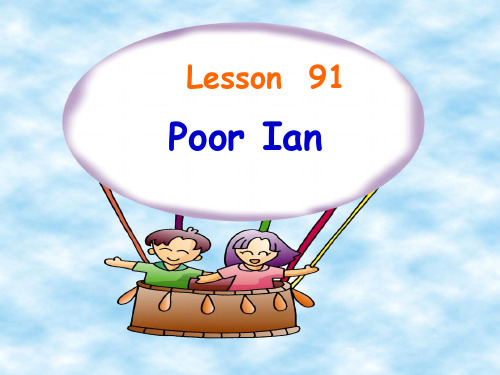
二、句型转换
• 1. I will go to Beijing tomorrow.(同义句) • 2.He will leave next month. (同义句) • A: He _____ ______ ______ leave next month. • B: He ______ ________ next month. • 3. We will have our lunch together. (一般疑问句) • 4.They will move to their new house next month. • (否定句)
at 12:00.
一般将来时的构成(二)
• 肯定句:主语+will+动词原形 • will为助动词,与情态动词用法相同,与动
词原形构成谓语,不需要根据人称进行变 化。 • 缩写:I will=I’ll • she will = she’ll • he will=he'll • they will= they’ll
Lesson 91
Poor Ian
★move
• 1. v. 搬家 • 短语: • move to/into +地点 搬到……地方 • move in 搬进(后面不能接宾语)
• 2.感动 • This story moves me.
★miss
① v. 想念,惦念 miss+人 想念某人 I miss my grandmother very much.
三、时态综合练习 --- 用所给词的适当形式填空
• 1.My father (go) back next Sunday. Then he can take me to the Great Wall.
• 2.Peter (go) back home at seven this evening.
新概念第一册 Lesson 91-92
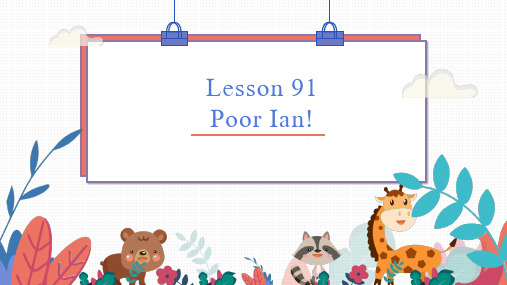
No, not yet. He’s _________ tomorrow.
CATHERINE: When? Tomorrow morning?
JENNY:
___. Tomorrow afternoon.
I’ll miss him. He __________ a good neighbor.
LINDA:
v. 邻居
poor /pɔː(r)/
adj. 可怜的
still
still /stɪl/
adv. 还,仍旧
E.g. Is he still working on his homework? 他还在写作业吗?
move
move /mu:v/
v. 移动,搬家
move to sp (some place) 搬到某处
LINDA:
______ you see Ian today, Jenny?
JENNY:
Yes, I will.
LINDA:
Please _____ him my regards.
CATHERINE: Poor Ian! He didn’t want to _____ this house.
JENNY:
No, he didn’t want to leave 是对上一句话的证实,要根据事实来决定用Yes
还是No, 翻译要以诚肯定的意思,“是的,他不想离开。”
参考译文
凯瑟琳:伊恩已把他的房子卖掉了吗?
詹
尼:是的,卖掉了。他上星期卖掉的。
凯瑟琳:他已经迁进新居了吗?
詹
尼:不,还没有。他仍在这里。他打算明天搬家。
CATHERINE: When? Tomorrow morning?
新概念英语第一册L91~92
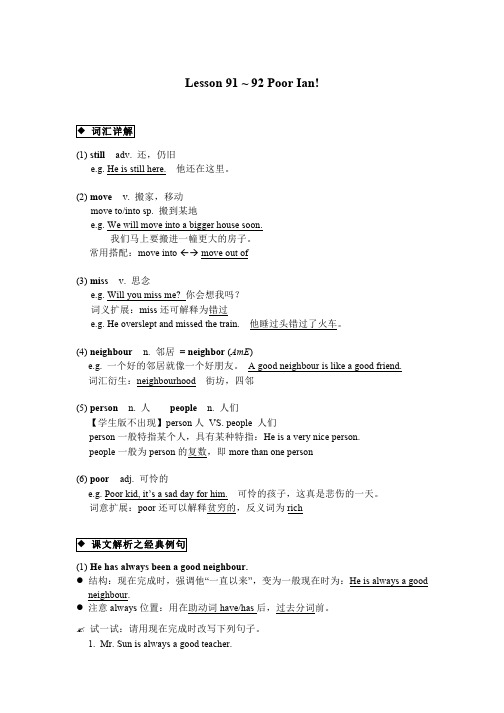
Lesson 91 ~ 92 Poor Ian!◆ 词汇详解(1) still adv. 还,仍旧e.g. He is still here. 他还在这里。
(2) move v. 搬家,移动move to/into sp. 搬到某地e.g. We will move into a bigger house soon.我们马上要搬进一幢更大的房子。
常用搭配:move into !" move out of(3) miss v. 思念e.g. Will you miss me? 你会想我吗?词义扩展:miss还可解释为错过e.g. He overslept and missed the train. 他睡过头错过了火车。
(4) neighbour n. 邻居= neighbor (AmE)e.g. 一个好的邻居就像一个好朋友。
A good neighbour is like a good friend.词汇衍生:neighbourhood 街坊,四邻(5) person n. 人people n. 人们【学生版不出现】person人VS. people 人们person一般特指某个人,具有某种特指:He is a very nice person.people一般为person的复数,即more than one person(6) poor adj. 可怜的e.g. Poor kid, it’s a sad day for him. 可怜的孩子,这真是悲伤的一天。
词意扩展:poor还可以解释贫穷的,反义词为rich◆ 课文解析之经典例句(1) He has always been a good neighbour.#结构:现在完成时,强调他“一直以来”,变为一般现在时为:He is always a good neighbour.#注意always位置:用在助动词have/has后,过去分词前。
新概念英语第1册课程讲义Lesson91-92
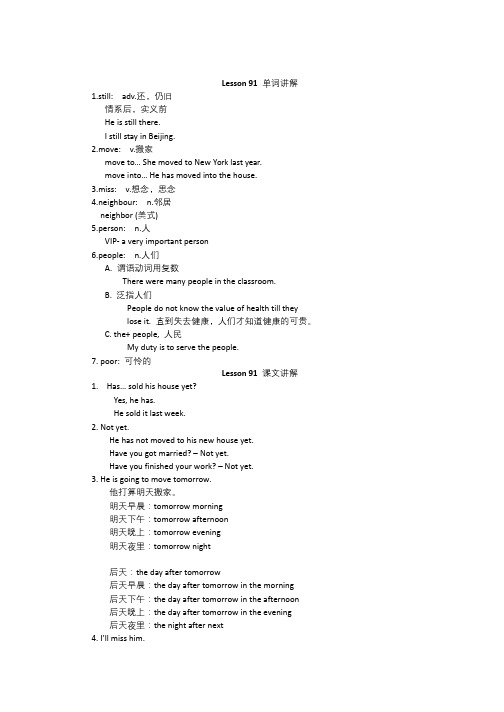
Lesson 91 单词讲解1.still: adv.还,仍旧情系后,实义前He is still there.I still stay in Beijing.2.move: v.搬家move to… She moved to New York last year.move into… He has moved into the house.3.miss: v.想念,思念4.neighbour: n.邻居neighbor (美式)5.person: n.人VIP- a very important person6.people: n.人们A. 谓语动词用复数There were many people in the classroom.B. 泛指人们People do not know the value of health till theylose it. 直到失去健康,人们才知道健康的可贵。
C. the+ people, 人民My duty is to serve the people.7. poor: 可怜的Lesson 91 课文讲解1. Has… sold his house yet?Yes, he has.He sold it last week.2. Not yet.He has not moved to his new house yet.Have you got married? – Not yet.Have you finished your work? – Not yet.3. He is going to move tomorrow.他打算明天搬家。
明天早晨:tomorrow morning明天下午:tomorrow afternoon明天晚上:tomorrow evening明天夜里:tomorrow night后天:the day after tomorrow后天早晨:the day after tomorrow in the morning后天下午:the day after tomorrow in the afternoon后天晚上:the day after tomorrow in the evening后天夜里:the night after next4. I’ll miss him.I’ll= I will…5. He has always been…主语+ have/has+ been+ 非动词a. 她一直以来都很漂亮。
- 1、下载文档前请自行甄别文档内容的完整性,平台不提供额外的编辑、内容补充、找答案等附加服务。
- 2、"仅部分预览"的文档,不可在线预览部分如存在完整性等问题,可反馈申请退款(可完整预览的文档不适用该条件!)。
- 3、如文档侵犯您的权益,请联系客服反馈,我们会尽快为您处理(人工客服工作时间:9:00-18:30)。
yet用于疑问句和否定句的句尾。
B: Yes, he has. He sold it last week.
A: Has he moved to his new house yet?
B: No, not yet. He’s still here. He’s going to move tomorrow.
person 强调的个体的人,可 以有复数形式persons people 通常是人的统称,单 复数形式相同people
She’s the right person for this job. There’re a lot of people in the park
poor 可怜的
穷的 穷的 可怜
A: When? Tomorrow morning? B: No. Tomorrow afternoon. I’ll miss him. He has always been a good neighbour .
现在完成时 指Ian自从在这住开始到现在一直都很好
A: He’s a very nice person. We shall all miss him.
单词学习
• • • • • • • still move miss neighbour person people poor adv. 还,仍旧 v. 搬家 v. 想念,思念 n. 邻居 n. 人 n. 人们 adj. 可怜的
already用于陈述句和肯定句句中
A :Has Ian sold his house yet?
区别
• be going to do (往往表示事先经过考虑的 打算) • wiБайду номын сангаасl do (多表示意愿决心 意愿) • 两者有时候不能互换。 • E g: I have bought some books and I am going to learn English by myself
•(be going to do 表示天气的突然变化 •(虽然是going但不是现在进行时,表将来) It’s going to rain.
1. There __________ a meeting tomorrow afternoon. A. will be going to B. will going to be C. is going to be D. will go to be 2. Charlie ________ here next month. A. isn’t working B. doesn’t working C. isn’t going to working D. won’t work 3. He _____ very busy this week, he ______free next week. A. will be; is B. is; is C. will be; will be D. is; will be 4. There _____a dolphin show in the zoo tomorrow evening. A. was B. is going to have C. will have D. is going to be 5. –________ you ________ free tomorrow? – No. I ________ free the day after tomorrow. A. Are; going to; will B. Are; going to be; will C. Are;going to; will be D. Are; going to be; will be
练习题
• 6. Mother ________ me a nice present on my next birthday. A. will gives B. will give C. gives D. give 7. – Shall I buy a cup of tea for you? –________. (不,不要。) A. No, you won’t B. No, you aren’t. C. No, please don’t D. No, please. • 8. – Where is the morning paper? – I ________ if for you at once. A. get B. am getting C. to get D. will get 9. ________ a concert next Saturday? A. There will be B. Will there be C. There can be D. There are 10. If they come, we ________ a meeting. A. have B. will have C. had D. would have
女士 错过了 只好思念
(1) v. 想念,惦念
I miss you. (2) v. 错过;未做到 他睡过了头,错过了他那 班火车。 He overslept and missed his train. (3)Miss 小姐 女士
miss
neighbour 邻居
neighbor
•person 人 •people 人们
give sb. sth. = give sth. to sb. 给某人某物=把某物给某人
B :Please give him my regards.
A :Poor Ian ! He didn’t want to leave this house.
同情某人时的常用语
B: No, he didn’t want to leave, but his wife did!
4.将be提前并大写。(主语是第一人 称I 或we时,I 或we变you),句末变 问号。
What are they going to do? They are going to watch TV.
What are they going to do ?
They are going to dance.
表达人的人品很好可以用good或nice。
B: When will the new people move into this move to = move into 搬进 house? A:I think that they will move in the day after tomorrow. B: Will you see Ian today, Jenny? A: Yes, I will.
是的
来看这一组句子
He didn’t want to leave this house. did he? No, he didn’t want to leave, but his wife did. 第二个句子是对第一个句子的证实,这里不可以 按照中文习惯去赞同别人的说法,而是要根据 事实来说,因此回答no, he didn’t want to leave. 但是翻译成中文的时候要说,是的,他 不愿意离开。 反意疑问句,前肯后否,前否后肯。 例句: He didn’t go to school last week, did he? No, he didn’t. 是的,他没去。 Yes, he did. 不,他去了的。
改写句子
1)Tom is going to go hiking.(改否定句) Tom isn’t going to go hiking. 2)I’ll help them.(改否定句) I won’t help them. 3)I’m going to get up at 6:30 tomorrow.(改一般疑问 句) Are you going to get up at 6:30 tomorrow? 4)We will meet at the bus stop at 10:30.(改一般疑 问句) Will you meet at the bus stop at 10:30? 5)She is going to listen to music after school.(对 划线部分提问) What is she going to do after school?
改写句子
1)Tom is going to go hiking.(改否定句) Tom going to go hiking. 2)I’ll help them.(改否定句) I help them. 3)I’m going to get up at 6:30 tomorrow.(改一般疑问 句) to get up at 6:30 tomorrow? 4)We will meet at the bus stop at 10:30.(改一般疑 问句) you meet at the bus stop at 10:30? 5)She is going to listen to music after school.(对 划线部分提问) she after school?
1.特殊疑问句
(what / when …)+be +主语+going to +动词原形? 主语+be +going to+ 动词原形
2肯定句
not going to shop
3 否定句
be后直接加not
Are you going to shop ? Yes ,I am. No, I am not.
练一练:
Practice
A、根据中文,完成句子,每空一词。 1)我打算明天和我的朋友去旅行。 I go on a trip with my friends tomorrow. 或 者: I go on a trip with my friends tomorrow. 2)下个星期一你打算去干嘛? 我想去打篮球。 ---What next Monday? ---I play basketball. 或者: ---What you do next Monday? ---I play basketball. 3)你妈妈这个周末去购物吗?是,她要去买一些水果。 --your mother go shopping this ? ---Yes, she . She buy some fruit.
